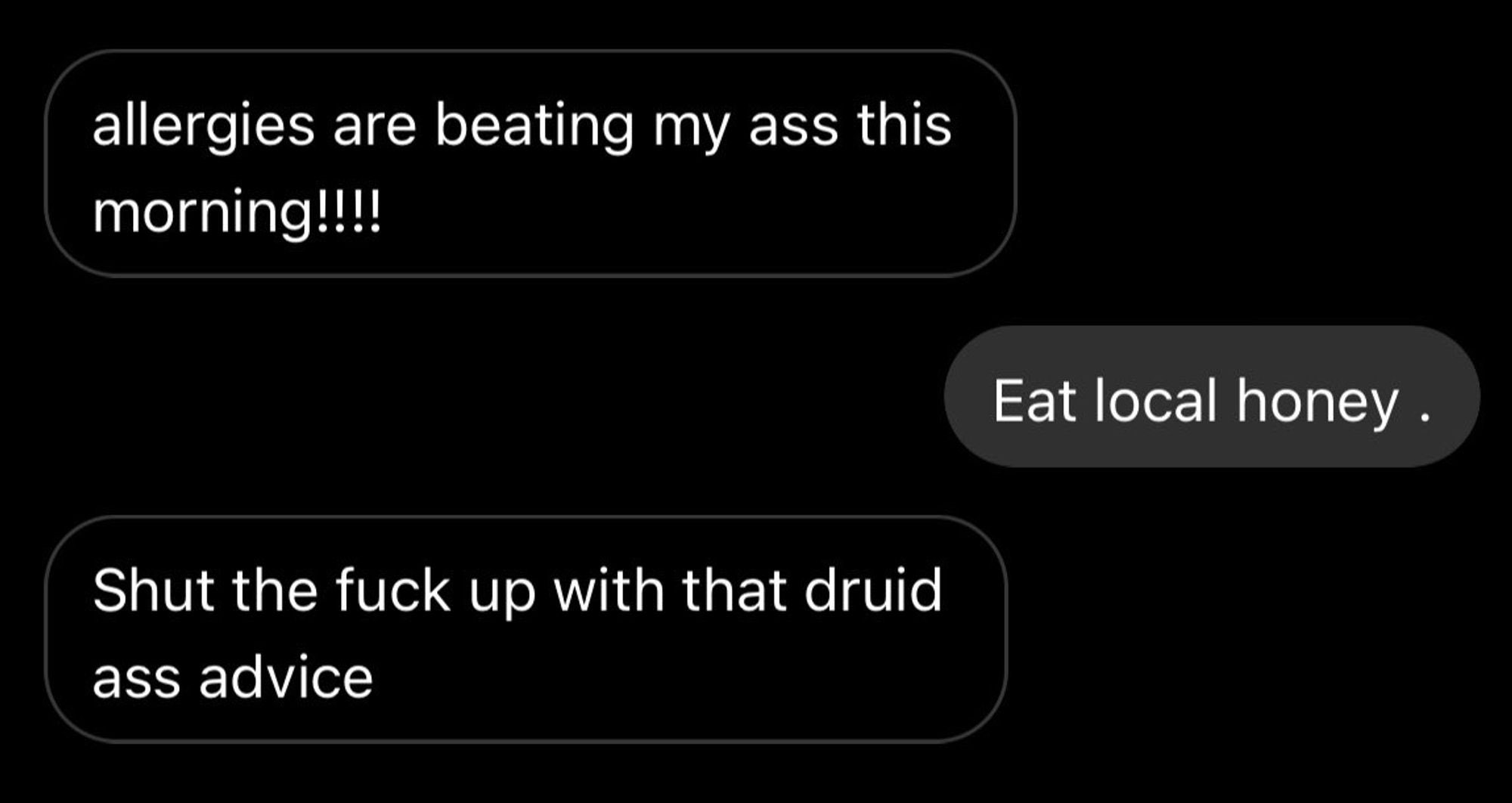I mean it's not terrible advice. Alleegies or not, local honey is generally delicious.
Funny: Home of the Haha
Welcome to /c/funny, a place for all your humorous and amusing content.
Looking for mods! Send an application to Stamets!
Our Rules:
-
Keep it civil. We're all people here. Be respectful to one another.
-
No sexism, racism, homophobia, transphobia or any other flavor of bigotry. I should not need to explain this one.
-
Try not to repost anything posted within the past month. Beyond that, go for it. Not everyone is on every site all the time.
Other Communities:
-
/c/TenForward@lemmy.world - Star Trek chat, memes and shitposts
-
/c/Memes@lemmy.world - General memes
While it's not a cure all, the advice is also legit.
Likely because honey has anti-inflammatory properties.
The local honey myth is about using the honey as a form of allergy immunotherapy since it would be from local pollen.
I thought it would work until I realized I've been exposing myself to pollen every damn year as it is. If my body was ever going to get used to it then it would have already lol
Now I just keep eating the honey because it's honey, why not? Lol
50 - 80g of honey a day?! Allergies are gone hello diabetes!
Seriously 1g honey to 1kg of body mass is insane. This is obviously ignoring the cost which is also insane.
Picked up spicy peach honey. Was delicious.
Then the habaneros came a-knocking.
Eat local, honey.
i'm not your honey, pal
I'm not you pal, sweetie
I'm not you sweetie, babe
I'm not your babe, buddy
But I like chain restaurants. And don't call me "honey".
Same idea as immunotherapy shots or sublingual drops.
Whether it's actually local, and if the allergens are actually concentrated enough to make any difference, is a very different question. Set of questions.
Don't forget this one: Is it actually honey? Honey flavored corn syrup doesn't help.
I'm guessing this is a US thing? At least I've never heard of it before as a european and I'm pretty sure it wouldn't be allowed to be sold as honey here
Yeah, us Canadians have to check the label to make sure the honey is Canadian, otherwise its usually 50% corn syrup.
Another easy tell is if you don't mix it for a couple months it splits, and all the corn syrup floats to the top.
American here ... we're really sorry. We don't like it neither; but the corporations, you see? they need their profits.
Another American here … I have literally never seen honey that’s been stepped on.
What brands do this?
Also very much a problem in Europe sadly. Of course not allowed, but pretty hard to detect. There are test that can tell the difference, but they are not accepted by the EU (yet?).
They said local honey, not factory made junk.
I would hope the roadside stand in front of the apiary has real honey and not corn syrup. But you never know...
Excuse me? Immunology shots are freaking amazing. I've been on them for about 2 years and the difference between last spring and this sptirng is incredible. I no longer need Allegra daily.
I think he meant for honey. The shots are very specifically concentrated lol.
Even then honey has some anti inflammatory effect that can help regardless of the added benefit of bee pollen
Pollution makes my hayfever so much fucking worse.
Walking down the river, trees, grass, weeds everywhere. Fine.
Walk to work down busy A-roads, eyes and nose streaming.
Fuck cars.
You’ll encounter more flowering plants in urban/suburban environments thanks to planning that favors male trees to female trees which makes more pollen.. So yeah, cars definitely contribute to breathing problems, but city planners make it even worse.
I see lots of competing discussion on whether this is a bs wives tale or not.
Its enough of an excuse to eat more delicious honey though
The things you are alleegic to aren't the things bees are making honey out of. We mostly have allergies to things that are broadcast spwaning obscene amounts their pollen like ragweed, mold, and grass, while bees use flowering plants to make their honey.
